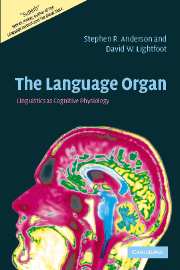Book contents
- Frontmatter
- Contents
- Preface
- 1 Studying the human language faculty
- 2 Language as a mental organ
- 3 Syntax
- 4 Sound patterns in language
- 5 Describing linguistic knowledge
- 6 Phonetics and the I-linguistics of speech
- 7 Morphology
- 8 Language change
- 9 “Growing” a language
- 10 The organic basis of language
- References
- Index
2 - Language as a mental organ
Published online by Cambridge University Press: 03 December 2009
- Frontmatter
- Contents
- Preface
- 1 Studying the human language faculty
- 2 Language as a mental organ
- 3 Syntax
- 4 Sound patterns in language
- 5 Describing linguistic knowledge
- 6 Phonetics and the I-linguistics of speech
- 7 Morphology
- 8 Language change
- 9 “Growing” a language
- 10 The organic basis of language
- References
- Index
Summary
In this chapter, we pursue an important source of evidence for the claim that human language has a specialized basis in human biology: the relation between what a speaker of a language can be said to “know” and the evidence that is available to serve as the basis of this knowledge. The apparently common-sense notion that an adult speaker's knowledge of his/her language arises by simple “learning,” that is, as a direct generalization of experience, turns out to pose a logical paradox. We begin with two brief examples that illustrate this point, and then explore the consequences of this for the mechanisms that must in fact underlie the development of language organs in normal human speakers.
We know more than we learn
A striking property of language acquisition is that children attain knowledge which, quite literally, infinitely surpasses their actual experience. On the basis of very limited experience, a productive system, a grammar, arises in each speaker which not only encompasses the actual facts to which they have been exposed, but also permits the production and comprehension of an unlimited range of novel utterances in the language. There must, therefore, be much more to language acquisition than mimicking what is heard in childhood; and there is more to it than the simple transmission of a set of words and sentences from one generation of speakers to the next.
- Type
- Chapter
- Information
- The Language OrganLinguistics as Cognitive Physiology, pp. 18 - 40Publisher: Cambridge University PressPrint publication year: 2002



